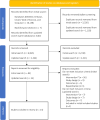Patient-facing online triage tools and clinician decision-making: a systematic review
- PMID: 40345692
- PMCID: PMC12067807
- DOI: 10.1136/bmjopen-2024-094068
Patient-facing online triage tools and clinician decision-making: a systematic review
Abstract
Objective: To evaluate the role of using outputs from patient-facing online triage tools in clinical decision-making in primary care.
Design: Systematic review.
Data sources: Medline, Embase, Cumulative Index to Nursing and Allied Health Literature, Web of Science and Scopus were searched for literature published between 1 January 2002 and 31 December 2022 and updated for literature published up to end of November 2024.
Eligibility criteria for selecting studies: Studies of any design are included where the study investigates how primary care clinicians make clinical decisions in response to patient concerns reported using online triage tools.
Data extraction and synthesis: Data were extracted, and quality assessment was conducted using the Mixed Methods Appraisal Tool. Narrative synthesis was used to analyse the findings.
Results: 14 studies were included, which were conducted in the UK (n=9), Sweden (n=3) and Spain (n=2). There were no studies that examined clinical decision-making as an outcome. Outcomes relating to the impact on clinical decision-making were grouped into three categories: patient clinical outcomes (n=9), primary care practitioner experience (n=11) and healthcare system outcomes (n=14). Studies reported faster clinical decisions made in response to patient concerns. Other studies reported clinicians offering unnecessary urgent appointments as patients learnt to 'game' the system. Clinicians felt confident managing patient requests as they can access additional information (such as a photo attachment). Moreover, clinicians' time was freed up from appointments with limited clinical value. Contrarily, online triage was perceived as an additional step in the workflow.
Conclusion: Clinicians should be aware that their decision-making processes are likely to differ when using online triage tools. Developers can use the findings to improve the usability of the tools to aid clinical decision-making. Future research should focus on patient-facing online triage tools in general practice and the process of clinical decision-making.
Prospero registration number: CRD42022373944.
Keywords: Digital Technology; Primary Care; Primary Health Care; Triage.
© Author(s) (or their employer(s)) 2025. Re-use permitted under CC BY-NC. No commercial re-use. See rights and permissions. Published by BMJ Group.
Conflict of interest statement
Competing interests: The lead author, AP, receives a PhD studentship via a Warwick Industrial Fellowship, in conjunction with eConsult Ltd. eConsult funds 50% of the studentship. They are not involved in the design or conduct of the research (beyond specifying the broad research area), and analysis is conducted independently of eConsult. All other authors have no completing interest to declare.
Figures

References
-
- Advice on How Tp Establish a Remote “Total Triage” Model in General Practice Using Online Consultations (Version 3) NHS England; 2020.
-
- Campbell JL, Fletcher E, Britten N, et al. The clinical effectiveness and cost-effectiveness of telephone triage for managing same-day consultation requests in general practice: a cluster randomised controlled trial comparing general practitioner-led and nurse-led management systems with usual care (the ESTEEM trial) Health Technol Assess. 2015;19:1–212. doi: 10.3310/hta19130. - DOI - PMC - PubMed
Publication types
MeSH terms
LinkOut - more resources
Full Text Sources
